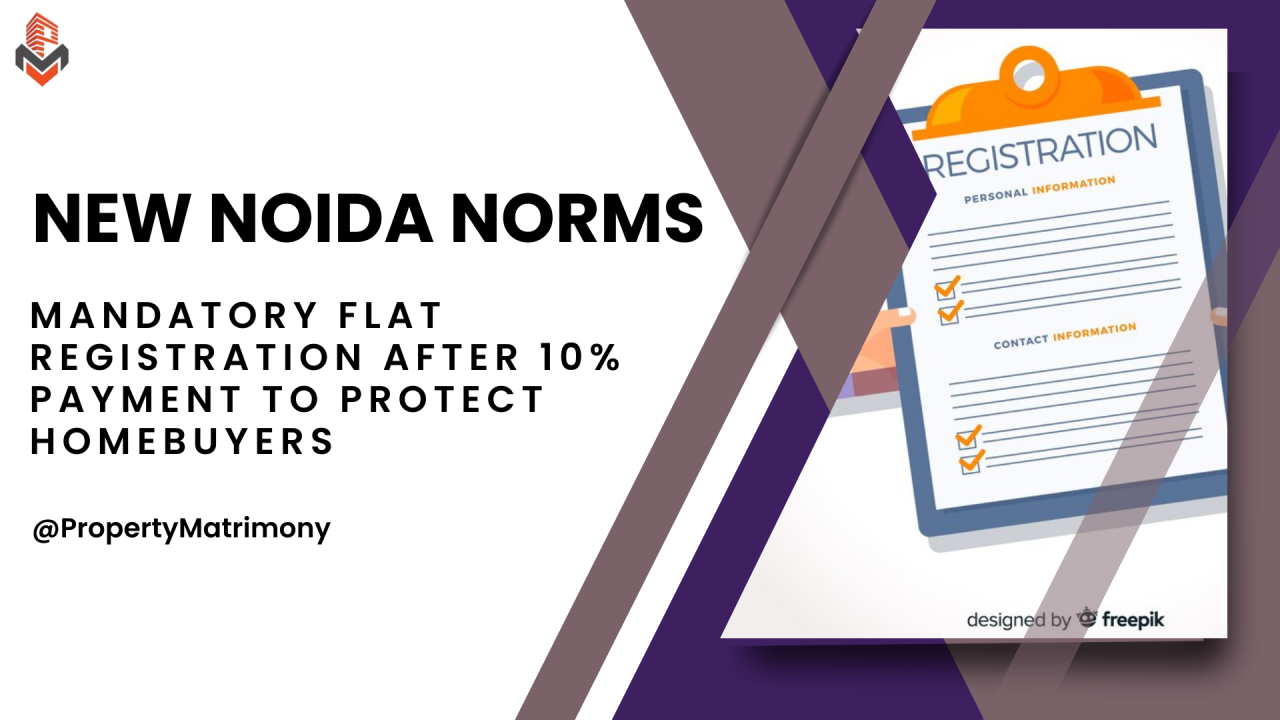
In a significant move to protect homebuyers, the Noida Authority has introduced a new regulation requiring real estate developers to register a flat with the buyer after receiving only 10% of the total payment. This shift is part of a broader strategy aimed at providing increased security and transparency to buyers investing in new residential projects in Noida, Uttar Pradesh. Central to this new policy is a tripartite "sale agreement" between the buyer, the builder, and the Noida Authority, adding an official layer of security and commitment to the transaction.
New Flat Registration Rules: What’s Changed?
Traditionally, flat registration in Noida occurred only upon completion of the project. Buyers would initially sign an agreement with the developer on a nominal Rs. 100 stamp paper, without any binding commitment from the Noida Authority until the project was completed and the developer had obtained both an occupancy certificate (OC) and a completion certificate (CC). Only then would the Noida Authority officially enter the contract, and flat registration would take place.
Under the new guidelines, however, the flat registration is required much earlier in the buying process. As soon as the developer collects 10% of the flat's total price, a formal sale agreement is to be signed not only between the buyer and the developer but also including the Noida Authority as a third party. This tripartite agreement provides a direct commitment from the Authority, giving homebuyers legal recognition and additional security from the outset of their investment.
Benefits of Early Flat Registration
Increased Buyer Security: By mandating registration after a 10% payment, the Noida Authority ensures that buyers gain legal recognition much earlier than before. This reduces risks associated with project delays, incomplete projects, and other uncertainties. Buyers now have a registered right to their flat early in the buying process, adding a legal safeguard that was previously missing.
Transparency and Accountability: The tripartite agreement brings the Noida Authority into the transaction, holding both the developer and the Authority accountable. The inclusion of the Authority in the initial sale agreement ensures that buyers have recourse in case of any disputes or issues during the project's construction.
Minimizing Financial Loss: Early registration reduces the likelihood of potential losses for buyers if a project stalls or fails. With legal recognition in place after 10% payment, buyers have a stronger claim and more robust legal standing, even if unforeseen issues arise.
Boosting Buyer Confidence in New Projects: For many homebuyers, particularly first-time buyers, the new registration rule may encourage more investment in under-construction properties, given the assurance of Noida Authority's involvement from the beginning.
Implications for Builders
While this regulation serves the interests of homebuyers, it also imposes a new layer of responsibility on developers. Builders now need to ensure prompt initiation of the registration process upon receiving 10% of the payment, which may increase administrative demands. Additionally, developers will be under greater scrutiny by the Noida Authority, pushing them to adhere more strictly to timelines and project milestones to avoid penalties or legal complications.
The Noida Authority’s new mandate for early flat registration is a progressive step that places buyer protection at the forefront of real estate transactions. By requiring a tripartite sale agreement after only 10% payment, the Authority addresses long-standing concerns about transparency and security in real estate. This rule change ultimately reduces financial risk, builds buyer confidence, and promotes accountability among developers.
As Noida continues to grow as a hub for new housing projects, this initiative could serve as a model for other regions to enhance buyer protection and establish greater trust in real estate transactions.